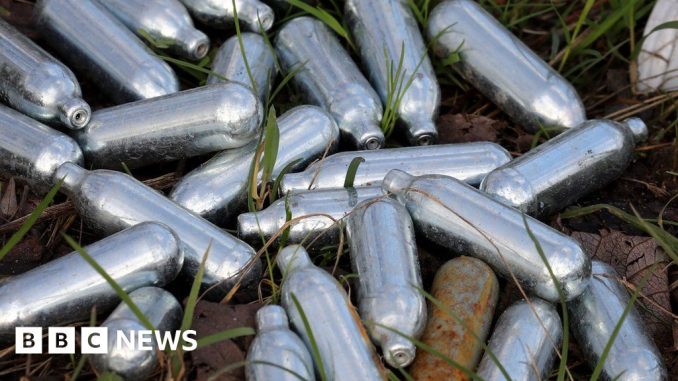
The government has made possession of nitrous oxide, or laughing gas, a criminal offence in England and Wales.
Its use soared during the pandemic, becoming one of the most-abused substances, especially by 16 to 24-year-olds.
What is nitrous oxide and what is it used for?
Nitrous oxide is a colourless gas that is inhaled and is commonly used as a painkiller in medicine and dentistry.
When mixed with oxygen, it is known as “gas and air”, which can help reduce pain during childbirth.
It is also used in catering, for example, in the production of whipped cream.
Many recreational users bought the gas in small metal canisters, released it into a balloon and then inhaled the contents.
What does nitrous oxide do to the body?
The gas can make people feel relaxed, light-headed or dizzy.
It can also cause headaches and make some users anxious; too much can cause fainting.
The most common early symptoms of neurological damage are a tingling sensation and numbness in the hands or feet.
Other symptoms highlighted in the report include stiff muscles, weak limbs, bladder or bowel complaints and sexual dysfunction.
How dangerous is nitrous oxide?
However, that figure includes deaths in medical settings, so not all were due to misuse.
Deaths typically occur due to secondary effects of using the gas, most commonly suffocation when the gas was used in confined spaces, for example in a car, or with a plastic bag over the head.
“Evidence suggests there is around one death per year in the UK from around one million nitrous oxide users,” said Prof David Nutt, from Imperial College London.
“[In comparison] around 28,000 deaths happen per year in around 40 million users of alcohol,” he added.
What punishments will recreational users face after the ban?
Nitrous oxide was previously controlled under the Psychoactive Substances Act 2016 – which meant production, sale or importation was illegal if the intent was to use it for its psychoactive effects.
But no regulations covered individual possession.
Those caught with nitrous oxide for unlawful use face a caution, community service or an unlimited fine.
Repeat offenders could serve up to two years in prison.
The maximum sentence for production or supply of the drug for unlawful purposes is 14 years.
Does the ban mean nitrous oxide will no longer be available?
Medical use is unaffected, and you will still be able to buy nitrous oxide as a propellant gas for whipped cream and other industrial purposes.
However, individual users will need to demonstrate they are lawfully in possession of the substance, and do not intend to use it for psychoactive effects.
The government says “reckless” producers and suppliers who do not thoroughly check the purpose of any sale will be breaking the law: “Turning a blind eye will be committing an offence.”
What is the legal position in Scotland and Northern Ireland?
Drugs policy is a so-called “reserved matter”, so the ban will extend to Scotland and Northern Ireland.
However, policing is devolved.
When MPs in Westminster voted through the new legislation in September 2023, SNP MPs voted against the ban, describing drug use as “a public health issue” rather than a criminal matter.
The Home Office says it is up to Scottish police to decide how to enforce the ban.
Is nitrous oxide harmful to the environment?
Nitrous oxide is emitted by natural sources such as oceans and soils. This is roughly balanced by natural processes that remove it from the atmosphere.
However, human activities – mainly agriculture but also processes such as burning fossil fuels – have disturbed this balance.
The excess nitrous oxide in the atmosphere contributes to rising global temperatures because it is a greenhouse gas, like carbon dioxide and methane. Nitrous oxide also damages the the ozone layer, which helps protect life on Earth from harmful radiation from the sun.
As a result, the ban on recreational use is likely to make little or no difference.


Be the first to comment